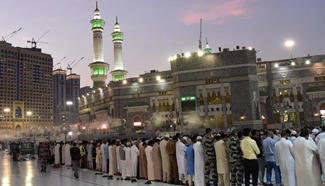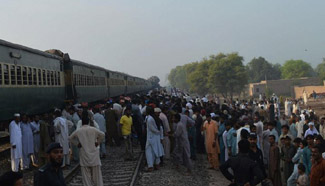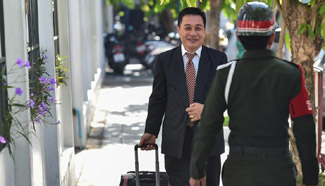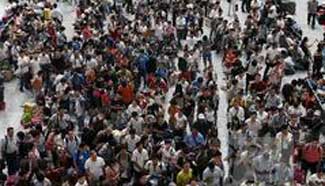by Xinhua writer Gu Zhenqiu
UNITED NATIONS, Sept. 15 (Xinhua) -- The Sustainable Development Goals (SDGs) officially entered into force on Jan. 1, 2016, meaning that its implementation is now simply "at a very early stage," but the progress by the global efforts to carry out the universal development goals "is very encouraging," a senior UN official told Xinhua.
Wu Hongbo, the UN under-secretary-general for the economic and social affairs, said in a recent interview that "many countries have already started delivering the 2030 Agenda at home, taking concrete steps and initiatives to set the implementation of the Agenda on solid ground domestically."
The 2030 Agenda, including its 17 SDGs, was approved by world leaders in September 2015 to serve as the blueprint for the global development efforts for the years leading up to 2030. The Agenda is also a plan for achieving a better future for all -- laying out a path over the next 15 years to end extreme poverty, fight inequality and injustice, and protect our planet.
"Many countries have already showed impressive ownership of the 2030 Agenda and the SDGs," he said. "Less than one year after the adoption of the Agenda, they have devoted considerable time and resources in analysing the implications of the 2030 Agenda and the relation between the sustainable development goals and targets and their national priorities; in putting in place consultation and coordination processes around the SDGs; in integrating the SDGs into their national strategies, plans and budget processes; and in setting up monitoring and evaluation systems."
"China is a good example, being amongst the very first volunteering countries that presented the national reviews at the High-level Political Forum on Sustainable Development this past July," he said.
"We must start implementation with a sense of urgency, and with all stakeholders on board. Each and every government, at all levels, needs to show strong ownership by aligning policies, legislation and resources in support of the SDGs," he said.
Governments should foster enhanced coordination among ministries, Wu said. "This will help to harness synergies among policies and reduce negative externalities. Such coordination can help to avoid silo approaches in policies, legislation and also budget allocations."
"Participation and inclusiveness of all stakeholders is also a basic need if we want to implement the ambitious Agenda at all levels," he said. "It is impressive to see how civil society and other stakeholders are already engaged to delivering the SDGs directly."
"Many countries have created mechanisms for social dialogue among stakeholders to follow implementation and review the 2030 Agenda, such as multi-stakeholder platforms and multi-stakeholder committees," he said. "Such institutions foster regular dialogue with civil society, as well as exchange of information and knowledge."
REVIEW MECHANISM
The United Nations set up a review mechanism to follow the SDGs implementation.
In the 2030 Agenda, heads of state and government committed to engage in systematic follow-up and review of the implementation of the 2030 Agenda, he said. "The follow-up and review is based on regular, voluntary and inclusive country-led reviews of progress at the national level feeding into reviews at the regional and global levels."
"The follow-up and review processes at all levels will track progress in implementing the universal goals and targets, including the means of implementation, in all countries, in a manner which respects their universal, integrated and interrelated nature and the three dimensions of sustainable development," he said.
At the global level, the United Nations high-level political forum on sustainable development (HLPF) has the central role in overseeing a network of follow-up and review processes, he said, adding that it is to work coherently with the UN General Assembly, the UN Economic and Social Council and other relevant organs and forums, in accordance with existing mandates, building on their work in order to boost implementation.
"To ensure that our actions have an impact and truly advance the SDGs, we must learn from one another," he said. "Each country has been successful in at least a few areas. Often, countries struggle to address challenges of a similar nature."
The new UN high-level political forum on sustainable development offers a platform to exchange lessons learned and review progress in implementing the SDGs," he said. "It is important that all governments and other stakeholders engage and participate in this exercise."
"Achieving Agenda 2030 will require revived cooperation for development where all countries meet as equals to jointly address global challenges and identify the global processes and resources needed for the goals and targets," he said.
"The Agenda 2030 calls for a revitalized global partnership for sustainable development," he said. "Intensified and innovative cooperation will be essential - between countries, among sectors and with private sector and civil society partners."
MAJOR CHALLENGES
"The scale and ambition of the 2030 Agenda lies in the SDGs," he said. "They will be the path to eradicate poverty in all its forms and dimensions, and an indispensable requirement for sustainable development. But, because of their ambition, implementing the SDGs is challenging."
A first challenge will be to translate the goals into national policies and planning, he said. "There needs to be the political will -- but also the capacity -- to translate the Agenda into national targets while respecting the ambition of the global agenda," he said.
In many countries, there will be a significant gap between the global targets and the national targets that they have set for themselves in the past, he said. "This gap is felt to be the greatest in low income countries (LICs). These countries will need support to step up efforts in some areas."
A second challenge is how to integrate the SDGs and targets into national plans and policies, he said. "Implementation requires pursuing the various SDGs in an integrated fashion."
It should also be shaped by the Agenda's distinctive features such as: "reach those furthest behind first"; focus not just on access but on quality; as well as the need for policy coherence, he said. "These are all complex propositions."
The third type of challenges is the weakness and inadequacy of the means of implementation, he said. "It also impeded progress on the MDGs," a set of eight anti-poverty targets replaced by the SDGs.










